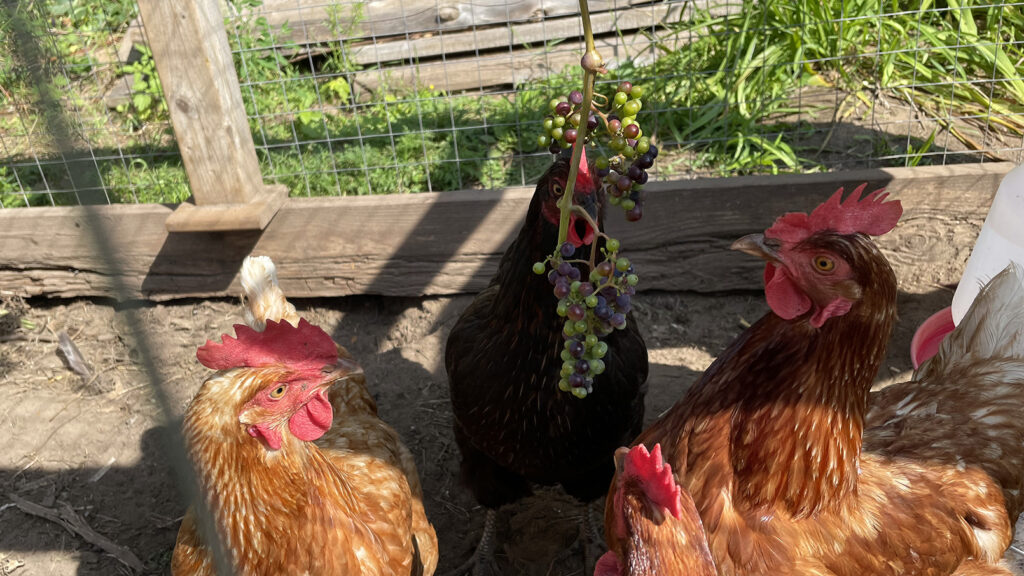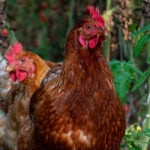Can Chickens Eat Grapes?

Photo by Dawn Guy/iStock/Getty Images Plus
Grapes are a well-known no-go for cats and dogs, but can chickens eat grapes? The quick answer is yes, but there are still details to be aware of before feeding this plump and juicy fruit to your feathered friends.
Ahead, we’re diving into everything you need to know about grapes and chickens, including the fruit’s nutritional benefits and drawbacks, how much is appropriate, and some important safety tips.
Psst! Before introducing any new food into your chicken’s diet, always check with your veterinarian.
Can Chickens Have Grapes?
Yes, chickens can eat grapes of all varieties, including raisins. However, this fruit is considered a special treat versus a part of a chicken’s complete diet—so it should be fed in moderation, says Anthony Pilny, DVM, DABVP (Avian Practice), medical director and director of education programs in Phoenix at the Arizona Exotic Animal Hospital.
Along with keeping grape treats to a minimum, be sure to only feed chickens fresh, frozen, or properly dried grapes (raisins), and always avoid feeding them fruit that’s moldy or otherwise gone bad.
Are Grapes Good for Chickens?
When provided as an occasional treat, grapes have many nutritional benefits for chickens.
“Grapes are not only high in calcium, potassium, and vitamins C and K, but they also act as antioxidants and anti-inflammatories, all of which are beneficial for chickens,” says Lisa Steele, a fifth-generation chicken keeper in Maine and founder of Fresh Eggs Daily.
“They aid in immune system support and bone health,” Steele continues. “They also provide moisture to keep birds hydrated in the summer when it’s hot outside.”
The nutritional benefits of grapes for chickens include:
- High in minerals such as calcium, potassium, and magnesium, per the Cleveland Clinic
- Loaded with antioxidant-rich vitamins C and K, according to Rochester University
- Aids in bone health, per the Asian Journal of Dairy and Food Research
- Keeps chickens cool and hydrated in the hot months
Are Grapes Bad for Chickens?
Grapes aren’t inherently bad for chickens; in fact, they have many nutritional benefits. However, in the same way you wouldn’t eat cupcakes all day long, grapes should be fed to our feathered friends in moderation, because they’re considered a sugary treat.
- High in sugar: “A cup of grapes would contain about 25 grams of sugar, and that is a lot more than any chicken should eat—even over a day,” says Dr. Pilny.
- Can cause gastrointestinal (GI) upset: Steele adds that ingesting too many can cause loose stools or bloating, and weight gain is possible if eating lots of grapes becomes a daily habit.
- Choking hazard: “Grapes can pose a choking risk to chickens, especially to smaller bantam breeds, chicks, or pullets, so cutting them in half or quarters, or chopping them up is recommended,” says Steele.
Pro Tip: As with all dried fruit, raisins have a more concentrated amount of sugar. Be wary of this when feeding your chickens treats.
How Many Grapes Can I Give My Chicken?
Treats, including grapes, should be fed to chickens sparingly, accounting for no more than 10% of your chicken’s daily diet.
“That equates to about 1 tablespoon per chicken per day of treats,” says Steele. “Giving each chicken one or two grapes [per day] is plenty.”
The rest of your chickens’ food should come from a high-quality, balanced layer feed along with any grass, weeds, or insects that they naturally eat on their own.
How To Safely Feed Grapes to Chickens
If you decide to add grapes to your chicken’s diet, make sure to follow these safety tips:
- Chop grapes. Cut the fruit into quarters, especially for small or younger chickens.
- Remove stems. Though these won’t hurt your chickens, they probably won’t eat them, so it’s a nice gesture!
- Toss old or moldy grapes. Chickens should always be fed fresh produce—not food you’re trying to get rid of.
- Feed in moderation. Treats should only total 10% of a chicken’s daily diet.
My Chicken Ate Too Many Grapes—What Do I Do?
A one-off of eating too many grapes isn’t likely to cause harm to your chicken. However, Dr. Pilny says it can lead to GI upset—including diarrhea and vomiting—and a decreased appetite. Call your veterinarian if your chicken shows any of these signs.
“If you know the changes are from overeating a certain food (like grapes) and the chicken is otherwise healthy, alert, and not appearing critically ill or worsening, you could monitor closely the first day,” Dr. Pilny advises. “You still should call and get an appointment with your veterinarian that you can cancel should it not be needed.
If you think your chicken has a grape lodged in their throat and is having trouble breathing, consult a vet immediately if you can’t easily remove it with your fingers or tweezers.
What Other Fruits Can Chickens Eat?
Fruit is a nutritionally loaded, delicious treat for chickens when given sparingly. Here are some additional fruits that chickens can safely eat:
- Pineapple: A fiber-dense fruit rich in vitamins A, C, and B6
- Watermelon: Hydrating, refreshing, and lower in sugar compared to other fruits
- Berries (strawberries, blueberries, raspberries, blackberries): Packed with an abundance of antioxidants
- Bananas: A soft, easy-to-eat treat full of potassium, fiber, and B vitamins
- Apples (without seeds): A crunchy, fiber-rich treat that supports digestion
FAQs About Grapes for Chickens
Q: Can chickens eat grape seeds?
A: Yes, grape seeds are safe for chickens to eat. However, they may pick around them and leave them behind.
Q: Can chickens eat grapes whole?
A: Adult and large chickens can safely eat whole grapes, including the skins and seeds. However, they can potentially create a choking hazard for small breeds or young chickens. Cutting them in halves or quarters will help alleviate this issue.
Q: Can baby chicks eat grapes?
A: Chicks can eat grapes in very small, finely chopped amounts after they’ve reached 3 weeks old. Because their digestive systems are still developing, too much fruit (especially something sugary like grapes) can cause diarrhea or digestive upset. Baby chicks should primarily eat balanced starter feed to ensure healthy growth.
Attributions
This content was medically reviewed by Teresa Manucy, DVM, Chewy veterinarian.



